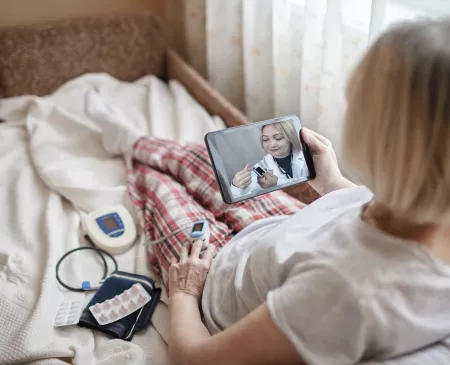The Buzz This Week
Last week, Mass General Brigham (MGB) announced a partnership with Best Buy Health to expand the health system’s Home Hospital Program, already one of the largest in the nation. The program provides acute hospital-level care to patients in their homes, delivering what the health system describes as “the same best-in-class services received at Mass General Brigham’s nationally recognized, award-winning medical centers.” The health system also operates the largest non-acute home care program in New England.
Best Buy has been aggressively growing its health business in recent years. The retail giant purchased connected health company GreatCall in 2018 (for $800 million), the remote patient monitoring (RPM) company Critical Signal Technologies in 2019 (for $125 million), and RPM technology firm Current Health in 2021 (for $400 million). In fact, Best Buy expects to grow its health sales faster than its base business in fiscal year 2024.
For hospital at home care, the partnership with MGB is the latest in a series of deliberate moves Best Buy has made to further delve into the acute home care space. The company has formed similar partnerships with marquis health systems such as Geisinger, Advocate Health (Atrium Health), Mount Sinai, and NYU Health.
While the hospital at home model was first explored in the United States in the 1990s, with positive results published in 2005, uptake by health systems was limited until the COVID-19 pandemic turned hospitals into conduits for viral spread. As a result, the Centers for Medicare and Medicaid Services (CMS) issued the Acute Hospital Care at Home Waiver program to allow the delivery and reimbursement of acute care at home. With the current waiver program extended through the end of 2024 as part of the omnibus bill passed at the end of 2022, more than 300 hospitals in 37 states have been approved for the waiver, as of November 8, 2023.
Evidence of continued growth in home-based care is supported by several studies and surveys. Nearly three-quarters of respondents in a recent New England Journal of Medicine Catalyst Insights survey said that home-based patient volume has increased over the past 2 years, with the biggest increase in acute care: 35% of respondents said they are providing hospital at home care now, versus 27% in August of 2021. The authors of the survey also note, “initial data shows this [hospital at home] approach has better outcomes.”
MGB began piloting a hospital at home model in 2016, well before the CMS waiver program. The health system officially launched their Home Hospital program in 2022 and by July 2022 had delivered inpatient-level care to nearly 2,000 patients in their homes. The health system announced in August of this year its intention to expand the program, growing capacity from about 30 beds per day to 200 or more in the next few years—an aggressive growth aspiration by any measure. It requires a substantial amount of personnel and infrastructure, including clinicians, equipment, technology, and logistics services. By partnering with Best Buy, MGB can leverage advanced tech and logistics support services that MGB does not have internally to enable the rapid and sizeable growth of the Home Hospital program. Best Buy’s services that MGB and other health systems have leveraged include:
- Lively Mobile Plus (formerly GreatCall), a personal emergency response system that detects falls and allows patients to contact urgent response personnel at any time of day.
- Current Health, a remote monitoring, care-at-home platform that connects patients to health professionals.
- Geek Squad, which works in conjunction with Current Health to help modify home environments to enable acute care delivery and train patients and family members on all equipment.
- Services that coordinate members of the care team to ensure safe and high-quality delivery of home-based acute care.
In their announcement, MGB and Best Buy stated that together, they intend to support the “transformational movement of shifting healthcare to patients’ homes by improving how quality and safe care are provided with technology and clinical expertise.” The 2 entities also underscored that general expansion of hospital at home programs beyond MGB will help address workforce shortages, one of the most frustrating and enduring challenges experienced across health systems. The 2 organizations plan to create “equitable, academic opportunities for individuals interested in pursuing nursing, paramedic, and digital technology careers” through scholarships for health professionals and trainees who choose to focus on the home setting for care.
Why It Matters
The partnership between MGB and Best Buy is the latest indication that large health systems are not only investing in home-based acute care programs but understand that they cannot scale quickly without expertise in certain technologies and logistics that they do not currently have in-house, and either don’t believe they have the time or do not want or to build themselves. Therefore, they are leveraging external partners like Best Buy Health to grow faster and more effectively. It points to a growing belief that healthcare in the home—including acute-level care—is the way of future care delivery, and that payers will reimburse programs and make it possible for providers to earn a margin—and support better patient outcomes.
The partnership also points to an increasing trend among healthcare disruptors: rather than directly providing healthcare services they are collaborating to provide products or services that can ameliorate gaps or inefficiencies. Both parties benefit—the retail/technology/logistics company diversifies its businesses and gains downstream service and product sales, while the health system can ramp up an increasingly popular modality of care that can lower costs, improve outcomes, and elevate patient satisfaction.
These collaborations also suggest that the market believes the hospital at home model is here to stay. Several market forces are driving that belief:
1. Most consumers would prefer to receive care at home. A survey conducted in the fall of 2020 found that more than 60% would prefer receiving treatment at home instead of a healthcare facility, with 62% citing comfort as the top appeal. Another survey in 2022 found that 70% of people over 50 would prefer in-home care.
2. Studies have shown that hospital at home programs can achieve cost savings, especially once a program has scaled. A randomized controlled trial published in the Annals of Internal Medicine in 2020 found a 38% mean cost savings per acute care episode delivered in the home model compared to a hospital inpatient model. Home acute care patients had fewer ancillary services, such as imaging studies and laboratory orders, and were readmitted within 30 days only 7% of the time, compared with 23% for hospital-based inpatients, indicating that outcomes were not negatively affected in the home care model. A separate study found that acutely ill older individuals experienced fewer adverse events when treated at home, and patient satisfaction was higher.
3. Hospitals are finding that home-based care can alleviate capacity and workforce constraints. For example, Atrium Health’s hospital at home program began in 2020 in response to a surge of patients seeking inpatient care as the pandemic spread. But inpatient volume continued to rise even when the pandemic waned, in part due to the aging of the population. In a recent NEJM Catalyst piece, Colleen Hole, Vice President of Clinical Integration and lead administrator for hospital at home at Atrium Health, underscored that there is a need to “think creatively about how to take care of this tsunami of older and sicker patients. Even though we are building new facilities, we continue to need more beds. However, if you think about it, we actually have enough beds in this market, they just happen to be in people’s homes."
4. Commercial payers are increasingly agreeing to reimburse hospital care provided in a home setting, likely due to the maturity of such programs, consumer preferences, and demonstrated cost savings. Consequently, even if the CMS Acute Hospital Care at Home Waiver program is not legislatively extended beyond the end of 2024 or made permanent, widespread reimbursement from private payers may be enough support to fuel the continued growth of hospital at home programs.
With new hospital at home partnerships emerging across the landscape and payers’ willingness to reimburse this modality of care, it is likely that consumers’ access to hospital at home services will expand over the next few years, part of the general shift of healthcare delivery into the home setting.
RELATED LINKS
Mass General Brigham:
Best Buy Health and Mass General Brigham Collaborate to Meet Patients’ Growing Healthcare at Home Needs
Johns Hopkins Medicine:
HOSPITAL AT HOME® Home-Based Care for Older Adults
Stat:
What the Hospital-at-Home Movement Tells Us About Igniting Innovation in Health Care
Workweek:
Inside Best Buy’s Big Bet on the Home
Editorial advisor: Roger Ray, MD, Chief Physician Executive.







